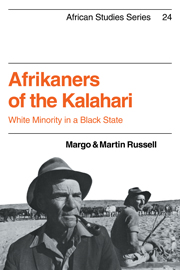Book contents
- Frontmatter
- Contents
- List of illustrations
- Acknowledgements
- A note on terminology
- 1 Southern Africa
- 1 The mundane Kalahari: an introduction
- 2 Boers, trekboers and bywoners: 1898–1930
- 3 Into the cash economy: 1930–72
- 4 Ghanzi Afrikaners 1973: a domestic description
- 5 Preserving boundaries: similarities, ambiguities and avoidances
- 6 Boers and Bushmen: dependence, interdependence and Independence
- 7 Sharing religion: attitudes to the conversion of the Bushmen to Christianity
- 8 Boers, bureaucrats and blacks
- 9 Prospect: whites in a black state
- Notes
- Bibliography
- Index
7 - Sharing religion: attitudes to the conversion of the Bushmen to Christianity
Published online by Cambridge University Press: 04 August 2010
- Frontmatter
- Contents
- List of illustrations
- Acknowledgements
- A note on terminology
- 1 Southern Africa
- 1 The mundane Kalahari: an introduction
- 2 Boers, trekboers and bywoners: 1898–1930
- 3 Into the cash economy: 1930–72
- 4 Ghanzi Afrikaners 1973: a domestic description
- 5 Preserving boundaries: similarities, ambiguities and avoidances
- 6 Boers and Bushmen: dependence, interdependence and Independence
- 7 Sharing religion: attitudes to the conversion of the Bushmen to Christianity
- 8 Boers, bureaucrats and blacks
- 9 Prospect: whites in a black state
- Notes
- Bibliography
- Index
Summary
In 1973 the small Gereformeerde congregation of twenty-five members at D'Kar was formally dissolved. Three pastors representing the Gereformeerde synod presided over the dissolution. They had travelled by car from Mariental in Namibia to the Botswana border, and there a truck driven by one of the congregation had met them to bring them the last three hundred kilometres to the church farm at D'Kar. In the church farmhouse they met with the men of the congregation. There were only eight of them. Yet it was not the smallness of number which prompted the dissolution. There had been fewer than twenty-one families when the congregation had been established in 1948 and no anticipation then of any startling increase in numbers. ‘The Gereformeerde do not go by strength of numbers but by strength of faith’, the dominie said. ‘In this we are unlike our sister church the Nederduitse Gereformeerde.’
The cause for dissolution was more significant: a directive from the Botswana government that the existence of the white Afrikaner congregation alongside a mission to the Bushmen by the self-same denomination was contrary to the government policy of non-racialism, and that the white congregation should in future amalgamate with the Bushman mission congregation.
In this chapter we consider the D'Kar congregation's response to the establishment of the mission and explore their attitudes to attempts at converting the Bushmen to Christianity.
- Type
- Chapter
- Information
- Afrikaners of the KalahariWhite Minority in a Black State, pp. 99 - 117Publisher: Cambridge University PressPrint publication year: 1979

